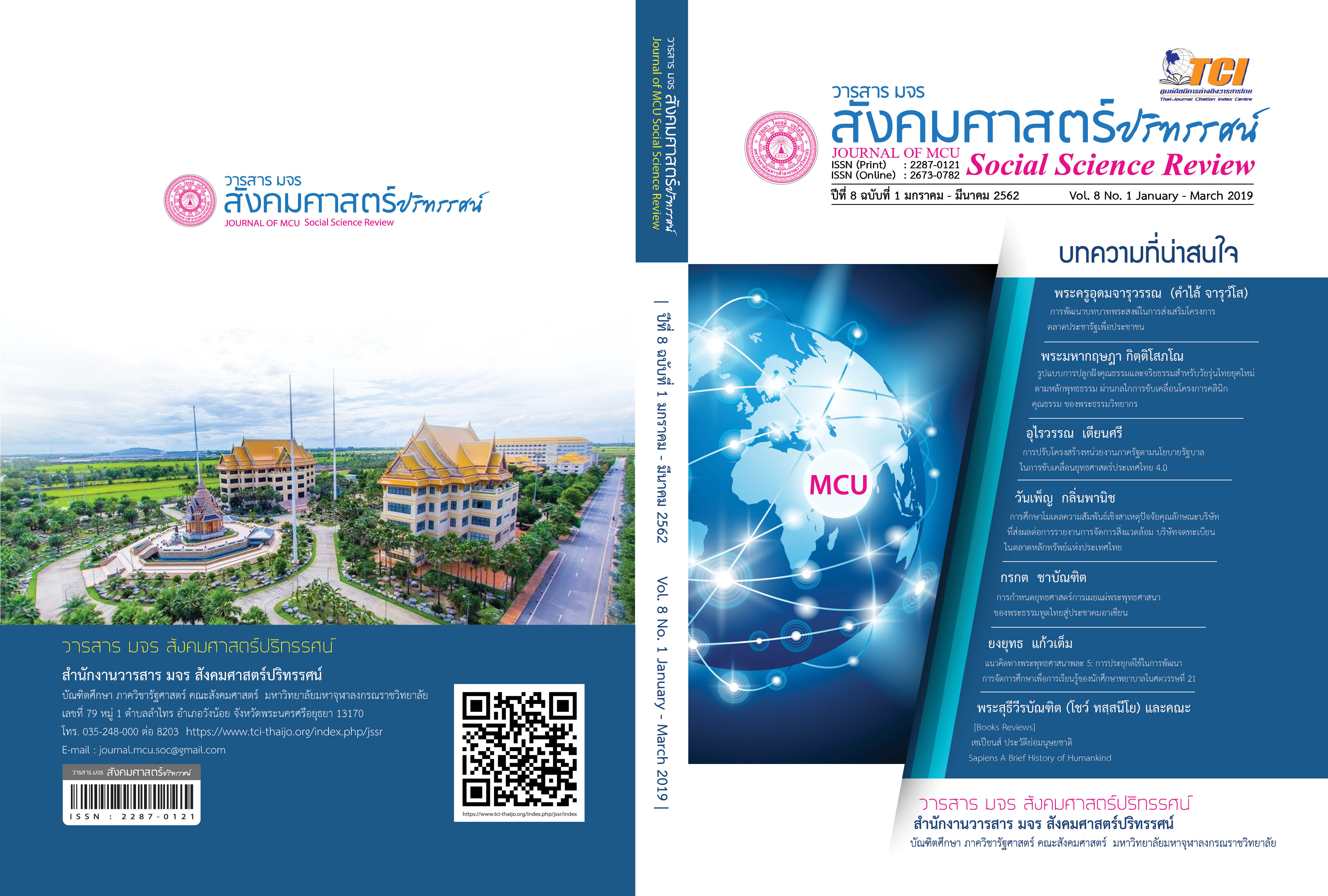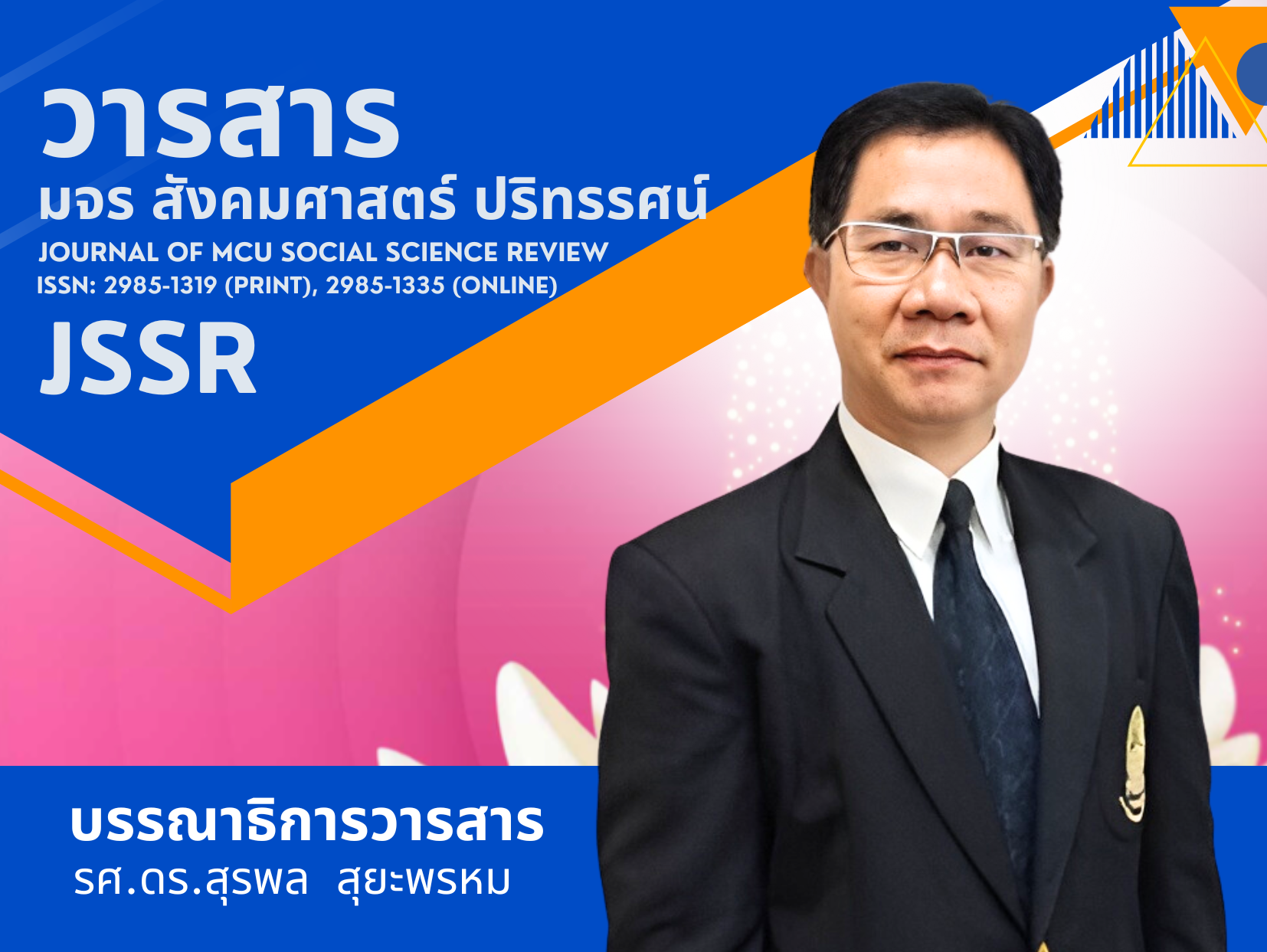THE MODEL OF PARTICIPATIVE ADMINISTRATION ACCORDING TO BUDDHISM PRINCIPLE OF THE PROVINCIAL ADMINISTRATIVE ORGANIZATIONS IN UPPER NORTHEASTERN PROVINCES
Keywords:
Administration Model, Participation, Buddhism, Provincial Administration Organization.Abstract
The objectives of this research were to 1) analyze the general conditions and problems of participatory administration of the provincial administrative organizations in upper northeastern provinces, 2) study the application of Buddhadhamma to strengthen the participatory administration of the provincial administrative organizations in upper northeastern provinces, and 3) present a model of participatory administration of the provincial administrative organizations in upper northeastern provinces.
The mixed research methodology between qualitative and quantitative was used in this research. The qualitative research was done by in-depth interview with 26 informants and the questionnaire was used for quantitative research, which in general had content validity at the 0.89 level. The research sample consisted of 400 informants. The statistics used in data analysis were frequency, mean, and standard deviation.
Research findings are concluded as follows:
- For the general conditions and the problems of participatory administration of the provincial administration organizations, it was found that people and government sectors still lacked of awareness about the ideas and the importance of participation. Moreover the tools used in participatory administration process were not obvious and clear enough, including information access between provincial administrative organizations and the people. This caused the trouble to the participation promotion procedure between provincial administrative organizations and local people.
- The application of Buddhadhamma to enhance the participatory administration of the provincial administrative organizations; namely the principle of morality to apply with the participatory administration of the provincial administrative organizations in upper northeastern provinces, in the parts of decision making, operation, participatory benefit receiving and participatory evaluation, could be brought to develop and strengthen the participatory process of the people. By this way, the skill in using tool for creating participatory process was obtained by government sector and people. It was not only to fulfill the process, but also access the gist of the participatory process.
- For a model of participatory administration according to Buddhadhamma of the provincial administrative organizations in the upper northeastern provinces, it was found that to bring the development model of the participatory administration according to Buddhadhamma was the application of the principle of morality 7 with the public’s participatory process; namely decision making, operation, benefit sharing, and assessment that could help government officials and people increase their skills and acknowledgement on participatory administration by attaching to the policy of frequent meeting arrangement, teamwork, organizational culture implementation, seniority respect, promoting the rights and freedom of women and others, creating the relationship toward organization and providing protection and welfare for sustainable achievement of the participatory administration of the provincial administration organizations in upper northeastern provinces.
References
College of Local Political Development King Prajadhipok's Institute. (2012). The King's Award '55 (KPI Awards). 1st edition. Bangkok: Common Press Limited.
Department of Local Administration. (2009). Local Development Plan Manual. Strategic Development Plan Three Year Development Plan And implementation plan. Bangkok: Department of Local Administration.
Development Office Form and structure Department of Local Administration. (population as of October 1, 2012).
Earwin William. (1976). Participation Managemeant : Concept Theory and Imlementation. Atlanta G : Georgia state Univercity.
Reeder Willam W. (1974). Some Aspects of the Informel Social Participation of Farmilies in New Yok State. Ph. D. Dissertation, Cornell Universcity,
Kantaphol Pichaisuk (2008). "Participation in wastewater management by government officials in the municipality of Thailand". Doctor of Philosophy. (Ph.D. Graduate School: Ramkhamhaeng University.
Kritsadakorn Yungthong (2012). Public participation in the development plan of Na Ngua Municipality Mueang Phetchabun District Phetchabun Province: A case study of the level of public participation in the development plan of Na Ngua Subdistrict Municipality. Faculty of Humanities and Social Sciences Phetchabun Rajabhat University.
Mahachulalongkornrajavidyalaya University 2539. Thai Buddhist Scriptures Mahachulalongkornrajavidyalaya University. Bangkok: Mahachulalongkornrajavidyalaya University Press.
Mukdahan Provincial Office. Mukdahan Provincial Development Plan (2010 - 2013).
Narinan Suriyanan et al. (2006). "Moral ethics that affect the management of the Tambon Administration Organization". Research Report. Promote and Promote the Moral of Moral Power). Office of Knowledge Management and Development (Public Organization).
Downloads
Published
How to Cite
Issue
Section
License
In order to conform the copyright law, all article authors must sign the consignment agreement to transfer the copyright to the Journal including the finally revised original articles. Besides, the article authors must declare that the articles will be printed in only the Journal of MCU Journal of Social Sciences. If there are pictures, tables or contents that were printed before, the article authors must receive permission from the authors in writing and show the evidence to the editor before the article is printed. If it does not conform to the set criteria, the editor will remove the article from the Journal without any exceptions.





